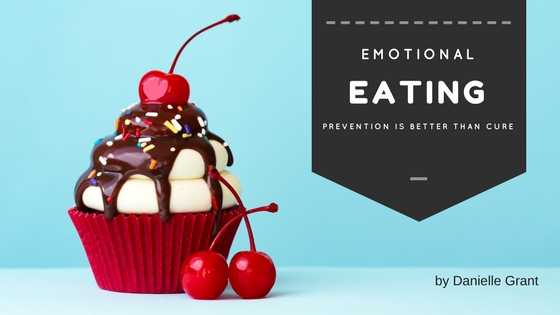EMOTIONAL EATING – Prevention is Better than Cure

In my 17 years as a personal trainer I’ve seen my fair share of emotional eating. It crops up time and time again and is a huge and common obstacle to good health.
I’ve seen adults with a lifelong pattern of eating in response to all sorts of emotions; sadness, anger, stress, frustration, loneliness, boredom – and sometimes not just eating but bingeing. If you spend 40plus years doing this, it becomes hard-wired into your brain – your default setting is to respond to painful emotions by eating. How hard do you reckon it is to reverse this pattern? Hard, bloody hard! But, with persistence and by doing the hard yards, it can be achieved.
But what if we could prevent that pattern developing in the first place? And as parents we have that opportunity with the next generation. Imagine giving your toddler daughter of today a life of not being an emotional eater – what a precious gift towards her long term health. If you are an emotional eater yourself, you will fully understand how powerful that gift could be. Life changing! What if it saved her from having a life-long weight issue or a love-hate relationship with her body but instead provided the foundation for a healthy relationship with both food and her body.
Yesterday morning as I was packing my daughters lunch box I was sad; the whole family was sad because our beloved family pet bunny Louie had died the night before. A thought popped into my head to pack a square of my special Lindt dark chocolate in her lunchbox as a little treat to cheer her up during the day. Luckily my beliefs and understanding around emotions and food kicked in and I actually stopped myself because of the message it would send her. I would be telling her that when we’re sad we eat sweet fatty delicious chocolate to cheer ourselves up. Instead I gave her lots of cuddles, walked her into her classroom (instead of dropping her at the gate) and explained to her teacher what had happened. I showed her love, care and compassion with my words, affection and actions – NOT FOOD!
But how often in society is food (and alcohol – but don’t get me started on that!!) used as reward or a way of making us feel better. In my case, it might have even made me feel better to give my little girl, struggling with her first real experience of grief, something to ‘sweeten’ her day.
Emotional eating is learned behaviour. If you’re an emotional eater, think back to your childhood and take a minute to ponder on how you may have learnt to be an emotional eater. Generally, emotional eaters have a lowered ability to cope well with stress and to read the internal cues of hunger and satiety which often results in eating for all the wrong reasons.
My tips to prevent your child from becoming an emotional eater:
- Don’t give so-called “treats” or food in general to sad, crying kids to make them “feel better”
- Don’t give “treats” or food to unhappy kids to make YOU “feel better”
- Don’t use food as a reward or bribe.
- Don’t let bored kids raid the fridge or pantry. Encourage them to do something else.
- Train your kids to listen to their bodies when it’s telling them they’re hungry and full. Kids are excellent at this and we need them to carry this skill into adulthood. A lot of us adults have lost this!
As parents one of the best things we can do is model a healthy relationship with food. Try to not go on crazy deprivation diets in front of them or eat lettuce leaves while they eat a proper meal.
Use your parent-power to set your kids up for a lifetime of good eating habits. Emotional eating is much easier to prevent than cure!
Danielle Grant
Exercise Physiologist – Wellness Coach – Health & Wellbeing Speaker
Reach Your Peak Personal Training
2/15 Kenji St Mornington VIC 3931
m: 0409 133 825

